|
|
|
Sort Order |
|
|
|
Items / Page
|
|
|
|
|
|
|
| Srl | Item |
| 1 |
ID:
069782
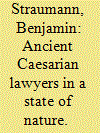

|
|
|
| 2 |
ID:
142544
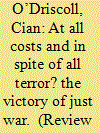

|
|
|
|
|
| Summary/Abstract |
Derived from the Latin Victoria, which itself can be traced to vino victus, meaning ‘to conquer’, victory evokes a number of close synonyms, principally conquest and triumph. It occupies an ambivalent position in respect of contemporary war. Though in some regards a concept that is essential to the very idea of combat, the notion of winning wars has acquired an ironic ring in the aftermath of two brutal world wars and the advent of nuclear weapons. Victory in war is clearly a contentious subject. Yet scholars of the just war tradition have largely ignored it. This article fills that breach by asking what, if anything, victory can mean in relation to just war? It argues that victory has an aporetic quality insofar as it appears both integral to but incompatible with the just war ethos. As such, it reveals both the limits and possibilities of just war thinking.
|
|
|
|
|
|
|
|
|
|
|
|
|
|
|
|
| 3 |
ID:
151647
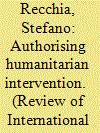

|
|
|
|
|
| Summary/Abstract |
Even scholars who support multilateralism in principle frequently question the value of securing approval from existing multilateral bodies for humanitarian intervention. The United Nations (UN) and regional organisations such as NATO, the argument goes, are far from democratic; furthermore, multilateralism is often a recipe for doing nothing; therefore, unauthorised intervention should be permissible in circumstances of ‘humanitarian necessity’. This article maintains that although today’s multilateral organisations and related procedures for authorising armed intervention may be suboptimal, they have significant output legitimacy. First, existing authorisation procedures reduce the risk of destabilising conflict spirals among powerful states. Second, they diminish the likelihood that humanitarianism will be used as a pretext. Third, they reduce epistemic problems concerning the identification of a just cause for intervention and thus the risk of accidental abuse. Fourth, they minimise the ‘moral hazard’ of humanitarian intervention. Finally, compliance with multilateral procedures is increasingly required for successful peacebuilding. This leads me to conclude that humanitarian warfare should always be authorised by the UN or regional multilateral organisations.
|
|
|
|
|
|
|
|
|
|
|
|
|
|
|
|
| 4 |
ID:
074079
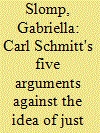

|
|
|
|
|
| Publication |
2006.
|
| Summary/Abstract |
Carl Schmitt famously alleged that a commitment to just war fosters the criminalisation and demonisation of the enemy. The aim of this paper is to trace, analyse and evaluate five arguments that can be found in Schmitt's opus elucidating and supporting the above claims. The paper suggests that even though Schmitt's critique of just war is typically extreme, it can nevertheless enrich the current debate on just war in so far as it challenges the common claim that the just war tradition occupies the middle ground between bellicism (that always justifies war) and pacifism (that never justifies war). Arguing against this widely held view, Schmitt claims that in the 20th century a belief in just war, far from representing a moderate position between extremes, is instead at the fore of an ideology that aims at dehumanising anyone who does not share its core values.
|
|
|
|
|
|
|
|
|
|
|
|
|
|
|
|
| 5 |
ID:
176029
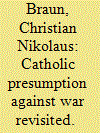

|
|
|
|
|
| Summary/Abstract |
One of the most contested arguments in contemporary just war thinking has been the question of the right starting point of analysis. On one side of the argument, one finds Catholic Church officials who argue for a ‘presumption against war’ as jumping-off point. On the other, one encounters critics of that position, led by James Turner Johnson, who defend a ‘presumption against injustice’ as the correct point of entry. Interestingly, both sides refer to St Thomas Aquinas, the key figure in the systematisation of the classical just war, as giving support to their respective position. While Johnson was vindicated as far as Aquinas’s historical starting point is concerned, debate about the contemporary purchase of the presumption against war has continued until the present day. Historical just war thinkers like Johnson have criticised the Church not only for turning the logic of the just war tradition on its head by reversing the inherited hierarchy between the so-called deontological and prudential criteria, but have also questioned the empirical evidence that has put the Church on this trajectory. In this article, I explain how the debate about the presumption against war continues to be relevant by engaging with the general direction the Catholic Church has taken up until Pope Francis and by investigating the particular example of its position on drone warfare. I point out that while the presumption against war runs counter to what Aquinas wrote during his days, Thomistic virtue ethics is generally open to development. The Church may thus claim a Thomistic patrimony in advocating for a presumption against war, but, as I demonstrate, the just war thinking that results, often referred to as modern-war pacifism, struggles to address important moral issues raised by contemporary warfare.
|
|
|
|
|
|
|
|
|
|
|
|
|
|
|
|
| 6 |
ID:
129835
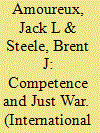

|
|
|
|
|
| Publication |
2014.
|
| Summary/Abstract |
This article argues that the Just War tradition would do well to consider the importance of competence - and that doing so would invigorate debates about the use of organized violence. The article defends this argument through several moves. First, inspired by Aristotle's thoughts on phronesis and chance, we view competence as a practice among those who, as a matter of course, engage in practical reasoning that takes into account the contingency of political action. Second, following from Arendt, competence can be considered that which foregrounds means over ends. Third, because competence is a continuous and more vigilant consideration of justice within war, it extends through both jus ad bellum and jus in bello principles, including the 'proper authority' and 'reasonable chance for success' conditions of the former, and the 'double effect' doctrine discussed in the latter. The article concludes by acknowledging the challenges presented by an overemphasis on competence, before ultimately restating its purchase for Just War debates in the twenty-first century.
|
|
|
|
|
|
|
|
|
|
|
|
|
|
|
|
| 7 |
ID:
176030
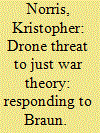

|
|
|
|
|
| Summary/Abstract |
In this response to Christian Braun’s article in this journal, I argue that the rise of drone warfare against terrorism suggests the necessity of the presumption against war (not its limit) and use the issue to advance this broader debate within just war theory at a pivotal moment in the tradition.
|
|
|
|
|
|
|
|
|
|
|
|
|
|
|
|
| 8 |
ID:
176031
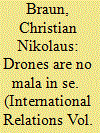

|
|
|
|
|
| Summary/Abstract |
This short essay responds to Kristopher Norris’s reply to my article entitled ‘The Catholic Presumption against War Revisited’. It engages with Norris’s three main points of critique.
|
|
|
|
|
|
|
|
|
|
|
|
|
|
|
|
| 9 |
ID:
151106
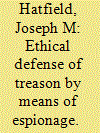

|
|
|
|
|
| Summary/Abstract |
This essay argues that treason by means of espionage is ethically justified when six factors are present, two of which are: that the political community being betrayed fails to secure for its citizens basic human rights and other means of peaceful or otherwise lawful protest are unavailable. The paper begins by analyzing the application of several theories of ethics to treason, including: consequentialism, deontology, the Just War tradition, and Michael Walzer’s influential concept of ‘dirty hands.’ It then criticizes these points of view and offers an account of jus ad proditione per intelligentia (just treason by means of espionage) based upon Aristotelian thinking about ethics and politics.
|
|
|
|
|
|
|
|
|
|
|
|
|
|
|
|
| 10 |
ID:
064802


|
|
|
| 11 |
ID:
153641
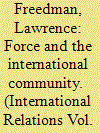

|
|
|
|
|
| Summary/Abstract |
Tony Blair’s April 1999 Chicago speech is widely seen as foreshadowing his later decision to support the invasion of Iraq. Two sets of context for the speech are described: other criteria for the use of force, going back to the Just War tradition and more recent contributions from Caspar Weinberger and Colin Powell, and the December 1998 strikes against Iraq and the Kosovo War, which began in March 1999. The origins of the five factors mentioned when considering force are explored and their implications assessed.
|
|
|
|
|
|
|
|
|
|
|
|
|
|
|
|
| 12 |
ID:
176033
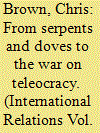

|
|
|
|
|
| Summary/Abstract |
In one of his earliest papers, ‘Serpents and Doves in Classical International Theory’ (1988), Nick Rengger set out themes that would be important to him for the next thirty years, including a Rortyan/Oakeshottian commitment to conversation as the appropriate mode of human inquiry, with the premise that there is no truth to be discovered, and a healthy scepticism directed towards reformist projects in international relations. These themes are present in his final works on just war and the anti-Pelagian imagination, but in a new, and less attractive, more dogmatic form. His critique of ‘teleocracy’ had hardened into something that no longer resembled a conversation, and his critique of progressivism involved the burning of a multitude of straw men. In 1988 Rengger aspired to be one of Rorty’s ‘edifying’ philosophers, by 2018 he seemed to have become committed to a system.
|
|
|
|
|
|
|
|
|
|
|
|
|
|
|
|
| 13 |
ID:
154877
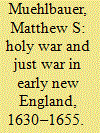

|
|
|
|
|
| Summary/Abstract |
New England’s leaders employed Western Christian concepts of holy war and just war to address regional crises between 1630 and 1655. Ex post facto attempts to justify the destruction of Mystic village during the Pequot War (1636–37) relied on holy war ideas. But other episodes, including attempts to avoid war, as well as the founding of the United Colonies of New England, demonstrated just war tenets. This essay will examine the use and misuse of these concepts, including during the First Anglo-Dutch War (1652–54), when disputes over a potential attack on New Netherland almost destroyed the alliance.
|
|
|
|
|
|
|
|
|
|
|
|
|
|
|
|
| 14 |
ID:
140875
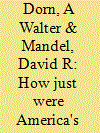

|
|
|
|
|
| Summary/Abstract |
To what degree were the wars waged by the United States ethically just? The answer is necessarily subjective, but would experts from across the political spectrum score conflicts in a similar fashion? In a survey of more than 100 international studies experts, the 18 major conflicts fought by the United States since 1900 were assessed. World War II was rated as the most just, whereas the Iraq Invasion was considered the most unjust. Respondents also scored each conflict under seven just war criteria: just cause, right intent, net benefit, legitimate authority, last resort, proportionality of means, and right conduct. The average of the criteria, the “Just War Index” (JWI), correlated strongly with the participants' measure of each conflict's overall justness, indicating the importance of the criteria. Participants who identified themselves on the political right gave higher JWI values for almost all conflicts than those on the left. The left rated seven conflicts unjust while the right found all to be just, though three only slightly so. Nonetheless, the ranking of conflicts was quite similar between the two groups. Though no conflict was deemed completely just or unjust, the US war spectrum ranged from highly “just” to highly “unjust.” The JWI approach offers a quantified and nuanced analysis of important ethical criteria—an approach that could be applied to other conflicts, including future ones.
|
|
|
|
|
|
|
|
|
|
|
|
|
|
|
|
| 15 |
ID:
132331
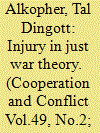

|
|
|
|
|
| Publication |
2014.
|
| Summary/Abstract |
The paper traces the evolution of just war discourse and its historicity. Taking St Augustine's crucial definition of just war as a war to avenge injuries as our starting point, we focus on the concept of injury in 'just war' discourse. The genealogy of the notion of injury is traced through the continuities, ruptures, and leaps in the evolution of its meaning, starting from the conceptualization of just war in medieval thinking to its manifestation in feminist thought. It specifically explores two aspects of the way injury is conceptualized: the meaning ascribed to the actual concept of injury and, secondly, the constructed appropriate reaction to injury. In conclusion, we assess how far injury is indeed socially constructed and try to determine the impact of its socially constructed meaning on just war thinking and possibly warlike practices.
|
|
|
|
|
|
|
|
|
|
|
|
|
|
|
|
| 16 |
ID:
133514
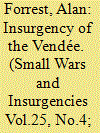

|
|
|
|
|
| Publication |
2014.
|
| Summary/Abstract |
The insurrection in the Vendée combined open warfare with the methods of petite guerre, ambushing French republican soldiers and cutting their supply lines to Paris. These tactics, when combined with the hatreds generated by a civil war, go far to explain to the cruelty of the conflict in the west and the depth of the hatreds it engendered. In republican eyes the use of guerrilla tactics was unjust and illegitimate, and they denounced their adversaries as common criminals and brigands, portraying them as backward, superstitious, even as subhuman, and in the process justified the savage repression they unleashed against them.
|
|
|
|
|
|
|
|
|
|
|
|
|
|
|
|
| 17 |
ID:
061568


|
|
|
|
|
| Publication |
Mar 2005.
|
| Summary/Abstract |
Debates using Just War theory to evaluate the morality of military action have been common as of late due to America's involvement in Afghanistan and Iraq since 9/11. However, in debating the ethical use of force, it is often forgotten that Just War doctrines were formulated in a very different political and strategic milieu than the 21st century. Moreover, proponents of traditional Just War fail to note that many of the tenets are more pragmatic than ethical. This paper provides a reconceptualization of both the pragmatic and moral bases of Just War theory and its relation to the War on Terror. More specifically, the paper reframes jus ad bellum and jus in bello, taking into consideration rogue states, weapons of mass destruction, and non-state terrorist actors and networks. In addition, the paper discusses the application of jus post bellum criteria and proposes that Cold War containment policies provide a model for advancing an ethical and practical War on Terror.
|
|
|
|
|
|
|
|
|
|
|
|
|
|
|
|
| 18 |
ID:
158996
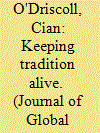

|
|
|
|
|
| Summary/Abstract |
The just war tradition is one of the key constituencies of international political theory, and its vocabulary plays a prominent role in how political and military leaders frame contemporary conflicts. Yet, it stands in danger of turning in on itself and becoming irrelevant. This article argues that scholars who wish to preserve the vitality of this tradition must think in a more open-textured fashion about its historiography. One way to achieve this is to problematize the boundaries of the tradition. This article pursues this objective by treating one figure that stands in a liminal relation to the just war tradition. Despite having a lot to say about the ethics of war, Xenophon is seldom acknowledged as a bona fide just war thinker. The analysis presented here suggests, however, that his writings have much to tell us, not only about how he and his contemporaries thought about the ethics of war, but about how just war thinking is understood (and delimited) today and how it might be revived as a pluralistic critical enterprise.
|
|
|
|
|
|
|
|
|
|
|
|
|
|
|
|
| 19 |
ID:
176034
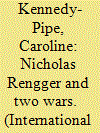

|
|
|
|
|
| Summary/Abstract |
Nicholas Rengger spent much of his career thinking and writing on the phenomenon of war. Eschewing any optimistic view that war could be abolished he also challenged the application of Just War theory to explain and justify the use of military force after the events of 9/11. His intellectual interactions with Jean Bethke Elshtain highlighted his growing unease with those in International Relations who sought to render palatable the use of torture, extraordinary rendition and technological ‘fixes’ in the pursuit of Western interests.
|
|
|
|
|
|
|
|
|
|
|
|
|
|
|
|
| 20 |
ID:
169104
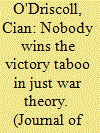

|
|
|
|
|
| Summary/Abstract |
This article examines how scholars of the just war tradition think about the ethical dilemmas that arise in the endgame phase of modern warfare. In particular, it focuses upon their reticence to engage the idiom of ‘victory’. Why, it asks, have scholars been so reluctant to talk about what it means to ‘win’ a just war? It contends that, while just war scholars may have good reason to be sceptical about ‘victory’, engaging it would grant them a more direct view of the critical potentialities, but also the limitations, of just war reasoning.
|
|
|
|
|
|
|
|
|
|
|
|
|
|
|
|
|
|
|
|
|